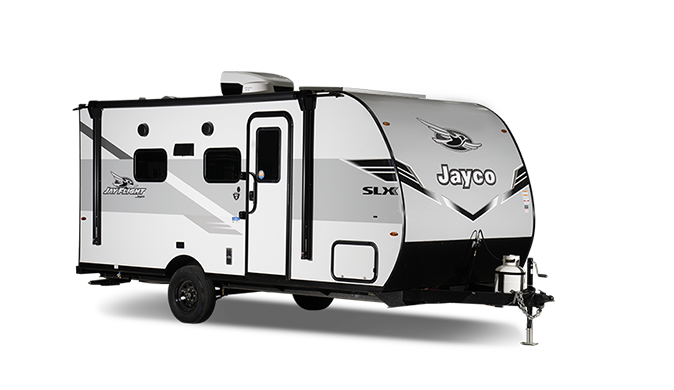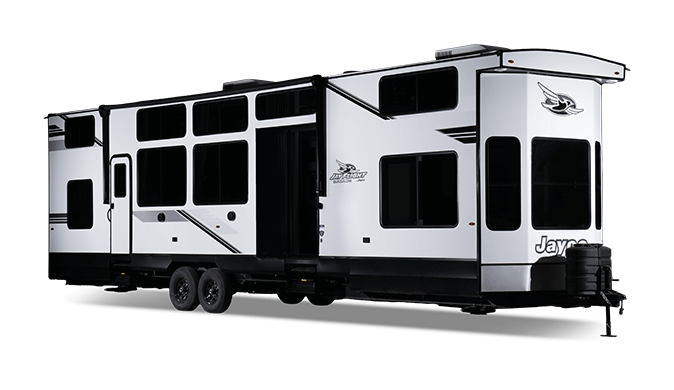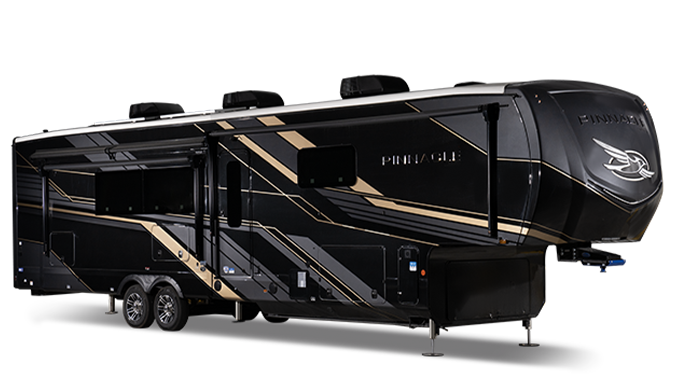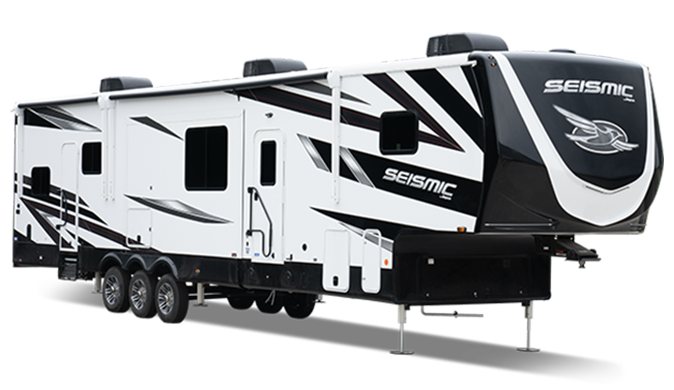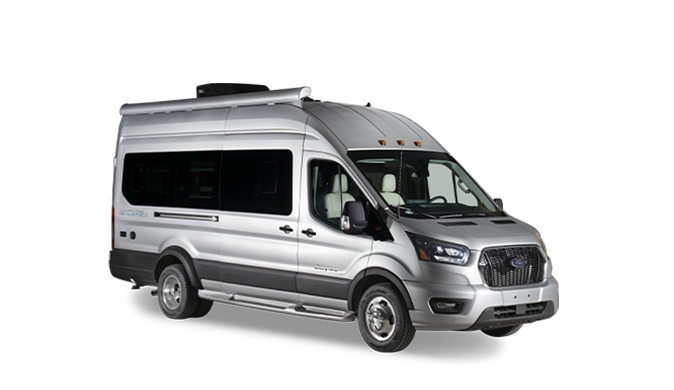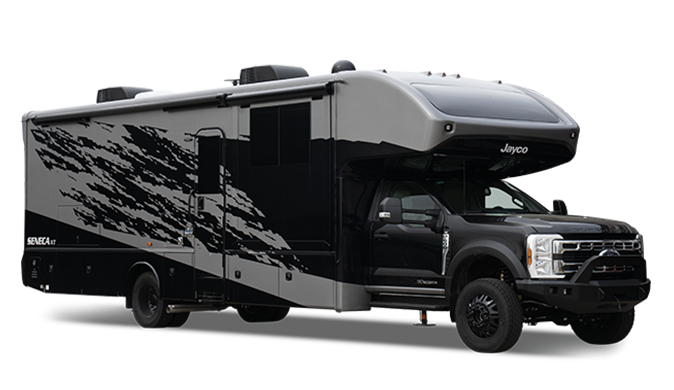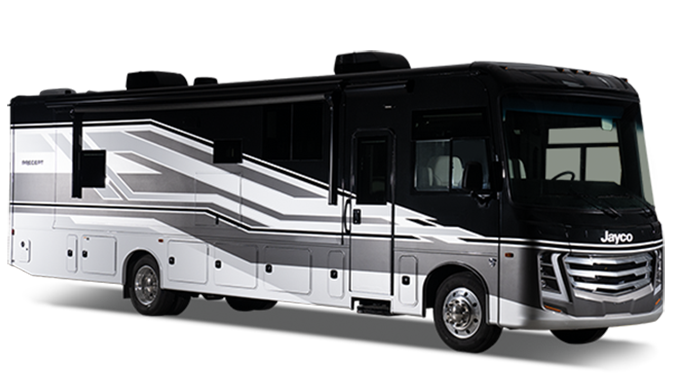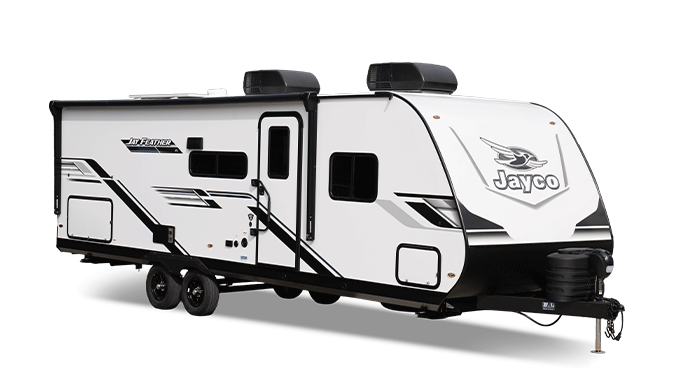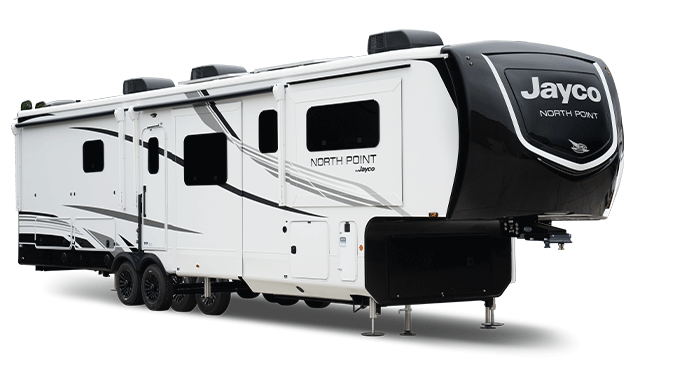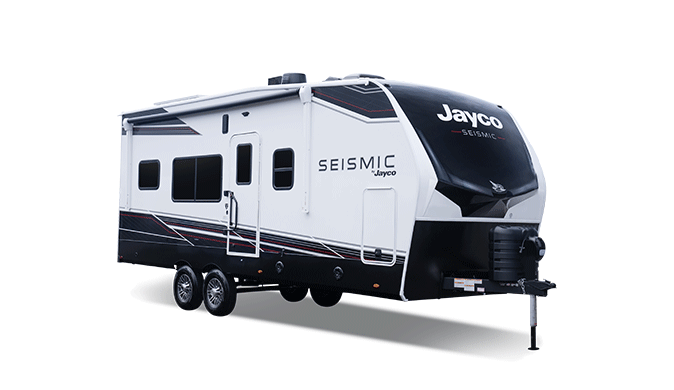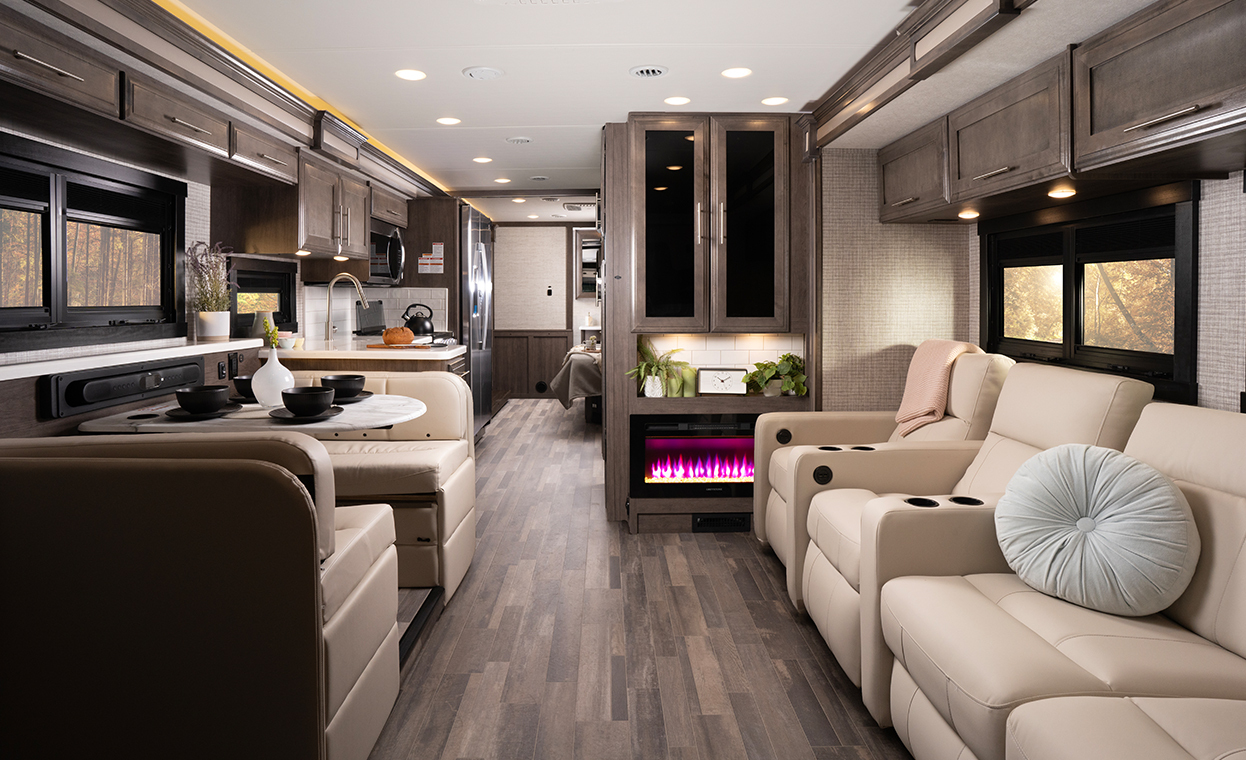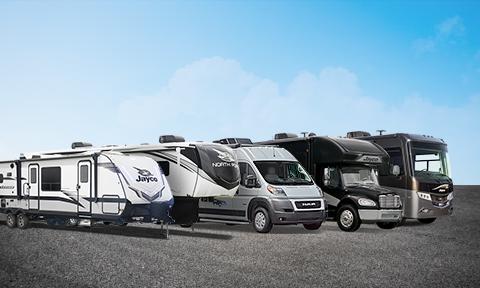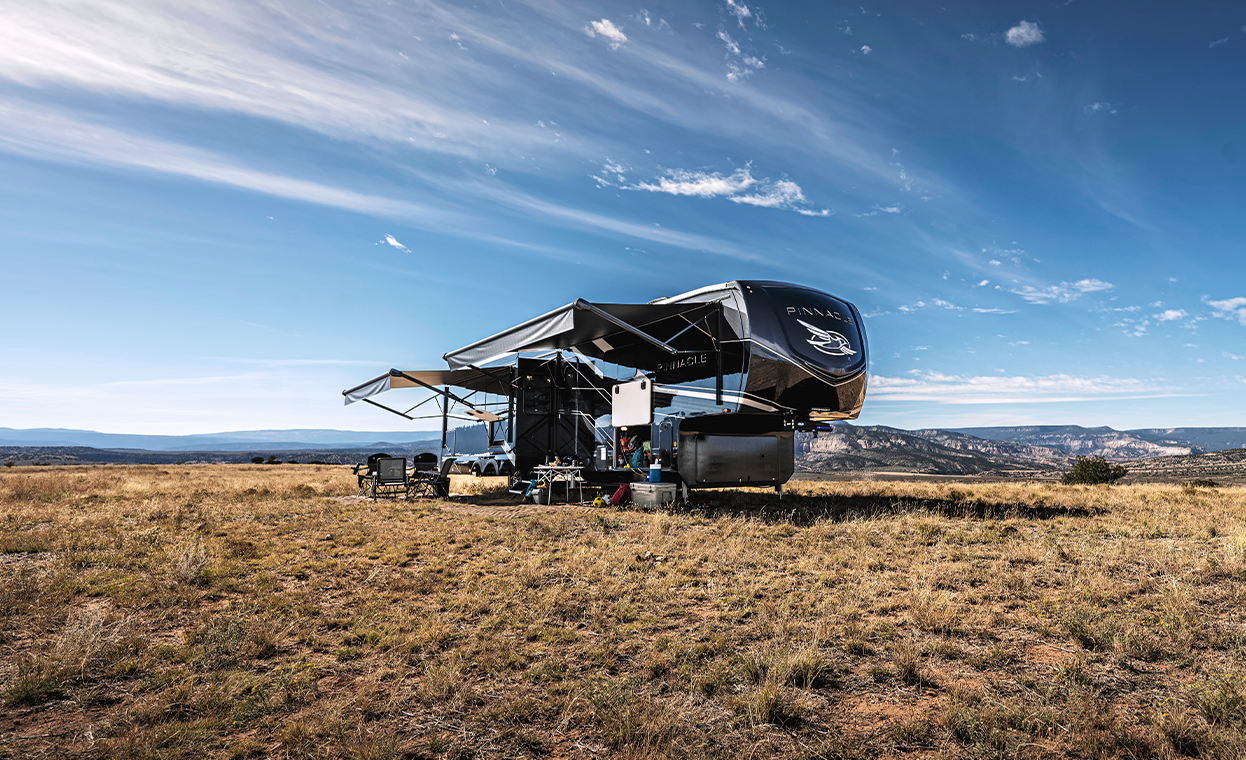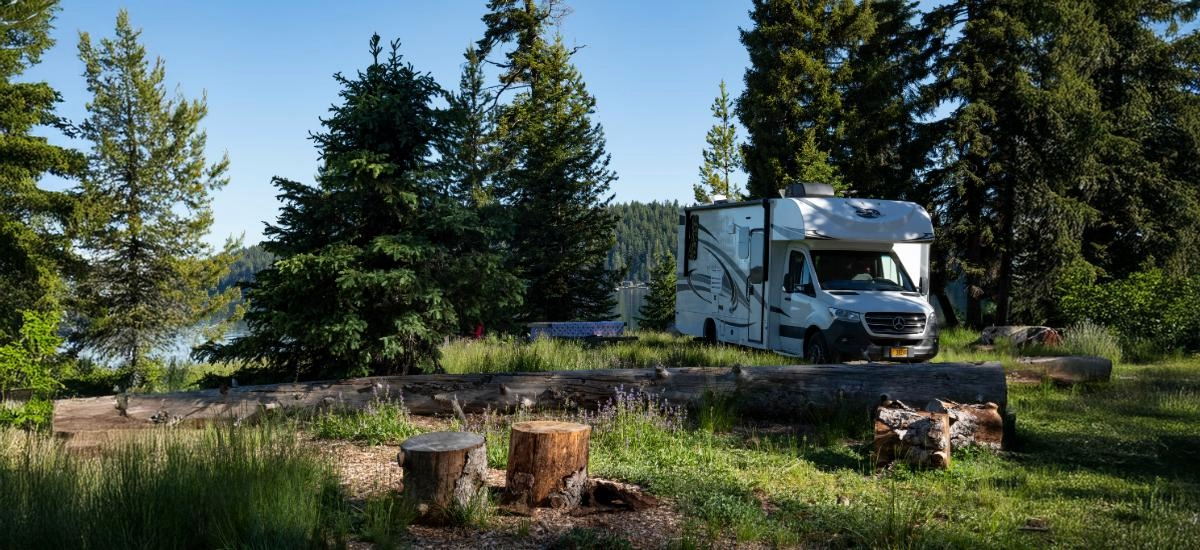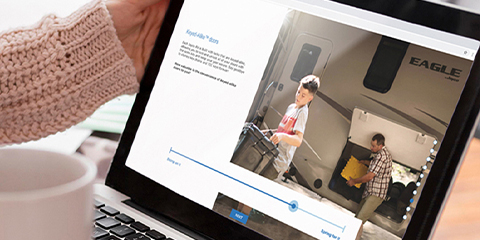So, you’re thinking about buying an RV? With so many things to consider and questions to ask, it might feel a bit overwhelming. But we’re here to help! We’ve shared some of the most important topics to speak with your dealer about so you feel extra prepared and ready to drive your new RV off the lot.
WHERE DO I START?
Start by asking yourself what you will be using the RV for. Are you planning on doing weekend trips with your motorcycle? Look into toy hauler options. Considering full-time RV living? Maybe you want more living space and a bigger kitchen. Hoping to do a lot of boondocking in remote areas without hookups? An on-board generator or a built-in solar package would be good options to consider. Do you need extra sleeping space for kids and visitors? A bunkhouse might be right for you.
We recommend writing down all of your RV needs and wants, and then ranking them in order of priority. Bring this list with you when you visit the dealer. Even if you can’t find an RV that checks every single box, at least you’ll have a list to help you prioritize and get as close to the perfect RV as possible.
Here’s a sample RV priority list to help you get started:
WHAT KIND OF RV IS RIGHT FOR ME?
While there are multiple different RV types on the market, we want to make it super simple so we have focused on three main categories: Motorhomes, Travel Trailers and Fifth Wheels.
MOTORHOMES
Motorhomes are all-in-one units, meaning you get both living quarters and a driving vehicle in one. They usually have all the desirable amenities—bedrooms, bathrooms and kitchens—and come in a wide variety of sizes and layouts. However, if you don’t plan to tow a car behind you, then your motorhome will be your sole driving vehicle. And because they come equipped with their own motor and driving systems, motorhomes typically cost more to buy and maintain.
TRAVEL TRAILERS
Travel Trailers are towed behind your vehicle, and can be pulled by a truck, SUV, even a car in the case of some lightweight travel trailers. Travel trailers come in a wide variety of sizes and price points, but are typically smaller and cheaper than fifth wheels. Unlike a motorhome, once you get to your final destination, you can unhitch your travel trailer and still have a vehicle to drive around.
FIFTH WHEELS
Fifth wheels are also towed behind your vehicle, but they’re different from travel trailers in that they get hitched to the bed of a truck instead of the bumper on your vehicle. While they are typically spacious and roomy, fifth wheels can be heavy, so a heavy-duty truck is often recommended to tow them. In addition to purchasing a fifth wheel RV, you’ll also have to purchase and install a fifth wheel hitch.
HOW DO I KNOW IF I CAN TOW AN RV?
If you’ve decided you want a towable RV, or need to know if your current vehicle can handle one, this section is for you. If you already have a vehicle, the very first step is to figure out if it can actually tow an RV. The easiest way to find out the tow capacity of your current vehicle is to check your owner’s manual. If you are unable to locate your manual you can also Google your vehicle’s make and model, along with the words ‘tow capacity’, keeping in mind that the specifics of your vehicle may differ slightly based on any added features. This number will tell you the maximum weight that your vehicle can pull. Be sure to share this number with your dealer. A good rule of thumb is to look for an RV that has a dry weight (the weight of the RV without any water, gas or gear on-board) that is 1,000 pounds less than your tow vehicle’s capacity.
If you need to buy a new tow vehicle, there are a few things to consider. First is the vehicle type. Some lightweight travel trailers can be pulled by SUVs and even sedans, whereas fifth wheels need to be pulled by trucks due to the hitch configuration (see next paragraph). If you have an idea of the type of towable RV you want, this will help determine what type of tow vehicle you should look to buy. The second thing to consider is the tow vehicle’s features. Things like bigger engines (especially diesel engines), transmission types, tire size, and four-wheel drive (4WD) can all add weight to your vehicle and possibly affect tow capacity. Manuals and tow guides will often list how much a vehicle weighs, but this number generally applies to the most basic model, so it helps to ask your dealer exactly how much your tow vehicle weighs—including any/all custom features. The last thing to consider is a tow package. Ask your dealer if the vehicle you’re interested in comes with a towing package. These packages can help with things like upgraded suspension and brakes, making it easier to pull a large RV.
If you’re looking to buy a fifth wheel, there are two things you will absolutely need. The first is a truck—all fifth wheels are pulled from a special hitch that is mounted to the middle of a truck bed. You won’t be able to tow a fifth wheel with a large SUV, as fifth wheels are designed to sit directly above the truck’s flatbed. The second thing you’ll need is a fifth wheel hitch. These specialty hitches don’t come pre-installed in any trucks, so you’ll need to buy one separately.
Here are some questions to ask your dealer about towing:
WHAT FEATURES SHOULD I LOOK FOR?
Once you’ve narrowed down which RV type you’re most interested in and you understand your towing capabilities, we recommend asking your dealer to show you a variety of different RV makes, models and floor plans. Keep in mind that doing a full walk-through of an RV can take a few hours—after all, you want a thorough look at the RV you’re going to buy! Take a video or some pictures on your phone to help you remember everything you’ve seen.
When touring different RVs, here are some key features to ask your dealer to show you:
WHAT IS MY BUDGET?
Setting a budget before starting your search is always a good idea. Figure out your ballpark number, then decide if you’re going to pay with cash or a loan—this will determine how much you’ll need upfront and how much you may need to pay in increments afterwards. Most RV loans are simple interest fixed rate loans, which means you can pay more than your required monthly payment and not incur a penalty. If you plan to obtain an RV loan from a bank or lender rather than through the dealership, you can apply and get pre-approved before you start shopping.
It’s also helpful to know what your budget will get you—having a basic understanding of what features come at what price points will help you decipher if something is truly a “sale” or not.
Here are some questions to ask your dealer about payment and financing:
WHAT WARRANTIES, ROADSIDE ASSISTANCE PLANS OR OTHER OFFERINGS ARE INCLUDED?
In addition to having a list of RV priorities and a budget range, be sure to ask your dealer about the kinds of warranties they offer with their RVs:
This last question is really important, especially if you plan to travel across the country. The last thing you want is for your slideout motor to die in Florida, only to realize you have to get it fixed at the dealership in California.
Some dealerships will also offer free or discounted roadside assistance plans, camping passes, maintenance programs, and other service offerings, so be sure to ask for additional details on those as well.
HOW DO I HANDLE INSURANCE AND REGISTRATION?
The last things to cover are insurance and registration. Start by calling the insurance provider for your current vehicle and see if they can provide a quote for adding an RV to your existing plan. It doesn’t hurt to shop around to other providers and see if you can get a more competitive rate. There may be different insurance requirements for full-time versus recreational RVing, so be sure and clarify.
For registration, you’ll want to do this either through your dealer or a local DMV. Registering your RV, even if it doesn’t have a motor, is a requirement. Keep in mind that registration costs will vary by state and by RV type—in some cases, the heavier the RV, the more your registration will cost.
The final two documents you should always ask the dealer for are the bill of sale and the manufacturer’s certificate of origin (MCO). The bill of sale proves that you actually purchased the RV and the MCO shows where the RV was built and by whom. Both of these documents are not only good to have for your records but may be required to obtain a title on the RV. Your dealer should help answer any questions you may have and provide all the necessary paperwork to ensure that your new RV is fully yours and legally allowed to drive on the road.
Here’s a quick check-list of things you should ask your dealer for as it relates to insurance and registration:

